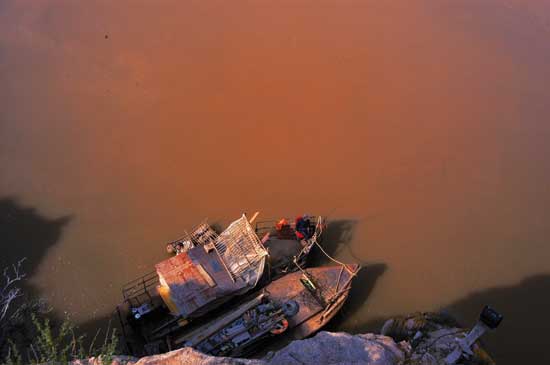Documentary about people living on the dead shown in 798 district
For thousands of years, millions of people have been making a living on the Yellow River. Some live on the fish they catch; some on transportation and some, on dead human bodies. A new documentary has captured a small group of people who survive on a seemingly gruesome profession.
 |
|
A scene from The Other Shore. [Global Times] |
The 52-minute film The Other Shore from director Zhou Yu, captures the daily life of a family from a riverside village in Gansu Province who make money by fishing dead human bodies out of the water and returning them to their families.
"Salvaging bodies out of the river used to be a voluntary act of boatmen in olden times. They returned the bodies as a favor," Zhou told the Global Times Saturday after his documentary was shown in Beijing's 798 Art District. "That time is over and younger people have developed it into a business."
Zhou's work was inspired by a newspaper article on Wei Zhiqian from Xiaoxia village in Gansu, who spent his life salvaging dead bodies that had drifted from the upper reaches of the Yellow River and returning them to their families.
"Back in the 1970s and 80s I often found several bodies a day," Wei said. "I remember some families offered me 40 cents after I gave the body back to them, but I never expected anything."
Wei ended his life's quest when a huge dam for a power station was built upstream in 2008. "The dam marked the end of the old man's work and also the end of an era," Zhou said.
When filming a story on Wei, Zhou discovered a family who had turned the ancient practice into a financially viable profession.
Li Heshan's family from Shangping village in Gansu Province work 24 hours a day, constantly scanning the river for floating bodies.
"The family is the only one to run the business in the village and is also the richest," Zhou said. "They charge each family who come to claim a body 6,000 yuan ($883) and above."
Although the Li family has built new houses and bettered their lives on the proceeds, many of their fellow villagers disapprove of the practice, Zhou said.
Zhou lived with the family for a month before shooting and witnessed them retrieving bodies from water almost every day. "There were people who committed suicide, drowned or were murdered," Zhou said.
While many scorn the way that the Li family lives, Zhou said that they are decent everyday folk.
"They work hard like normal people and they make money out of that," he said. "They have nerves that most people don't have. How many people would like to go look for stinky corpses even if they are paid?"
He added that it was not his intention to discuss the morality of Li's family's profession, instead he wanted to focus on what happened to the dead.
 0
0 






